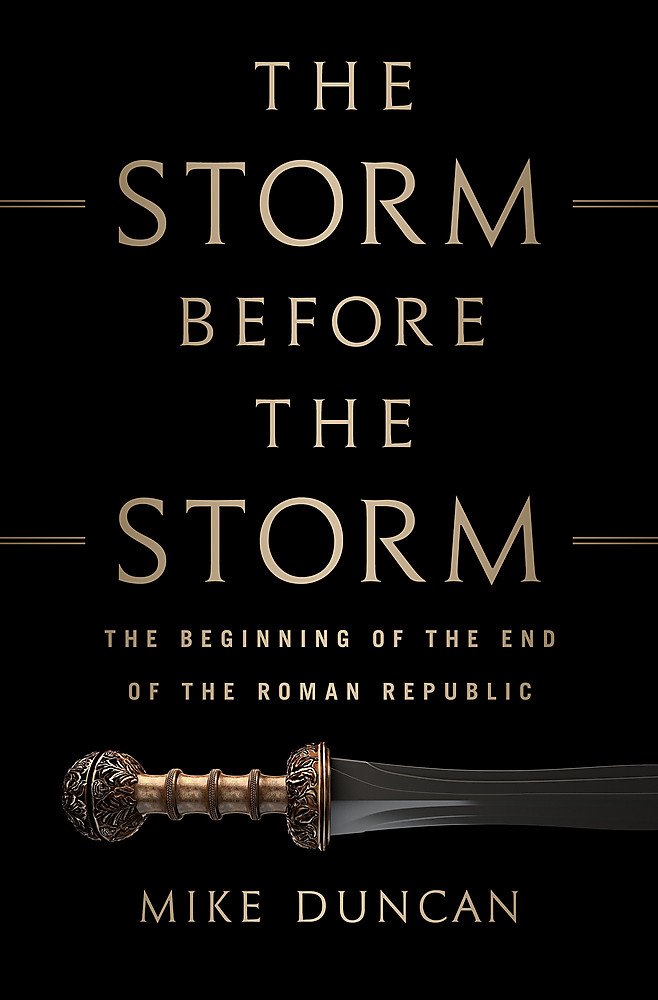Book Review - The Storm Before the Storm by Mike Duncan
November 08 2020I was gifted this book by a friend a few years ago, and frankly I didn’t try hard enough to get through it. The Storm Before the Storm describes the events of the roughly last 100 years of the Roman republic, before Julius Caesar created the Roman empire. It’s stunning to see the parallels between the Roman Republic and our own system of politics.

The first section of the book is a long prelude that describes the creation of Rome, its involvement in several wars, and the basic setup of how Roman politics works. The first time, I couldn’t get through the prelude, and I gave up on the book. This time, it was still hard to get through the prelude, but once I did, the book started flying by. Duncan is a great story teller. The book is really just a history book. But it reads in a more entertaining way.
My takeaways on the similarity between Roman and US politics:
- Duncan describes the erroding of Roman norms and customs, i.e. the "way things are done". These are not laws or official process, but they are just customs. Politicians first started disobeying these norms, and the result was very fast political change, and then just as fast the political consequence.
- The seesaw of power from different political factions seems to gain velocity and intensity. That means, once one political faction went farther than never thought previously, the other faction would fight back with even greater intensity, and the cycle of these events seemed to shorten. For us here in 2020, Biden just won the presidency, but if Rome is a historical guide, it probably means we will continue to be more polarized, and the GOP will strike back with even greater intensity in 2024 (or even sooner.
- The general appeal of populism vs. conservatism. One of my Chicago Booth professors once started a speech by saying that Economics is the study of resource allocation, and this fundamental study explains almost all human history. It's true. There will always be a faction of people that benefit from the current system and want to maintain power. There will always be a second faction of people that long to get a greater share of the pie. In Rome, the conservative faction was literally represented by the nobility, who populated the senate, while the citizens could only go through the Assembly (similar in nature to the House of Representatives). The incredulous thing is that the US has no nobility, but we have created a similar notion via our own senate, where states have great power for the simple reason of having made a decision to call itself a state more than 100 years ago. The frustrating thing is that it is entirely unclear how one should think of a state. Why is there a North and South Dakota, but California is one state?
In addition, here are some of my observations on what completely surprised me, and how Roman history isn’t really that similar to our current climate:
- Several times, after populist leaders either tried to or even successfully passed populist reform, the strike back from the nobility was literal riot and murder. Several populist leaders were murdered in the street and then dumped into the Tiber river. As dangerous and polarized as US politics has become, it's hard to imagine an angry mob storming Washington D.C. and murdering a popular politician openly in the street.
- The progressiveness of the populism was really striking. Tiberius Gracchus was kind of the original populist in Rome, and his proposal was literally to take government-owned land and give it to citizens. It's hard to compare something like food stamps to getting actual land.
- The strong correlation between military and political leadership. All the consuls (similar in nature to the Presidency, as the highest possible elected office with executive privilege) were expected to win wars. Their skill in the battlefield was part and parcel with their ability to influence politics. We seem (fingers crossed) to be in a post-war climate. It's hard to imagine any military leader capturing enough of the public attention to become President (although it of course has happened in the not so distant past).
All in all, this was an excellent book, and I will probably re-read it in a few years because there are still plenty of lessons to learn from it.
comments powered by Disqus